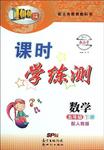题目内容
Someone says, “Time is money.” But I think time is more 1 than money. Why? Because when money is spent, we can make it again. However, 2 time is gone, it’ll never 3 . That is 4 we mustn’t waste time.
It goes without saying that the 5 is usually limited(有限的). Even a second is very important, we should make full use of our time to do 6 useful.
But it is a pity that there are lots of people who do not know the important of time. They spend their limited time smoking, drinking, and 7 . They do not know that wasting time means wasting part of their own 8 .
In a word, we should save time. We shouldn’t 9 today’s work for tomorrow.
Remember we have no time to 10 .
1. A. beautiful B. important C. interesting D. difficult
2. A. what B. where C. when D. who
3. A. return B. get C. take D. go
4. A. what B. that C. because D. why
5. A. money B. time C. day D. food
6. A. nothing B. something C. anything D. whole thing
7. A. reading B. writing C. playing D. working
8. A. time B. food C. money D. lives
9. A. stop B. leave C. let D. give
10. A. lose B. save C. spend D. take
1—5 BCADB 6—10 BCDBA

 百年学典课时学练测系列答案
百年学典课时学练测系列答案One day, I heard an American boy say to a Chinese girl student, “You speak very good English.” But the girl answered, “No, no. My English is very poor.” The foreigner was quite 1 at the answer. Thinking he had not made 2 understood or the girl had not heard him clearly, he said, “Yes, indeed, you speak very well.” But the girl still kept saying, “No.” In the end the American boy could not understand and didn’t know 3 to say.
What’s wrong with the girl’s answer? She didn’t 4 a compliment (恭维)in the same way as the American people do. She should answer, “Thank you” instead of “No”. She 5 understood what the American boy had said, but she thought she should be modest. In the west, people will feel proud and 6 when they are praised(赞扬). So if someone says the dishes you have cooked are very delicious, you should say, “Thank you.”
In our country we think being modest is a virtue (美德) and being proud is a bad thing, but in my opinion, being confident does not 7 being proud, so sometimes you should be confident 8 being modest.
9 you are modest and say, “No, I’m afraid I can’t do it well”, while working in a western country, the others may think that you really cannot do it. If you often say “No”, you will certainly be looked down on by others. When asking for a job, if one says something like “Yes, I can certainly do it” instead of “Let me have a try ”, he or she will 10 get it. So in the west, you should be brave to show your self-confidence.
| 【小题1】 |
|
| 【小题2】 |
|
| 【小题3】 |
|
| 【小题4】 |
|
| 【小题5】 |
|
| 【小题6】 |
|
| 【小题7】 |
|
| 【小题8】 |
|
| 【小题9】 |
|
| 【小题10】 |
|
American people like to say “Thank you” when others help them or say something kind to them. People of many countries do so, too. It is a very good habit. You should say “Thank you” when someone passes you the salt on the table, when someone walking ahead of you keeps the door open for you, when someone says you have done your work well, or you have bought a nice thing, or your city is very beautiful. “Thank you” is used not only between friends, but also between parents and children, brothers and sisters. “Excuse me” is another short sentence they use. When you hear someone say so behind you, you know that somebody wants to walk past you without touching you. It’s not polite to break others when they are talking. If you want to speak to one of them, say “Excuse me” first, and then begin talking. You should also do so when you begin to cough or make any noise before others. Let’s learn to say “Thank you” and “Excuse me”.
【小题1】You should say “Thank you” when ______________.
| A.you say something kind to others |
| B.you help others |
| C.someone helps you |
| D.you need others to help you |
| A.widely used in the world |
| B.used more often than “Excuse me” |
| C.used only by American |
| D.used only between friends |
| A.cough | B.make some noise |
| C.go first | D.all of the above |
| A.Thank you | B.That’s very kind of you |
| C.Excuse me | D.I’m sorry |
| A.to be happy | B.to be polite |
| C.to help others | D.to learn from Americans |
 hen
they know that, they’ll understand you better. This also helps you feel more at
home when talking with others.
hen
they know that, they’ll understand you better. This also helps you feel more at
home when talking with others.